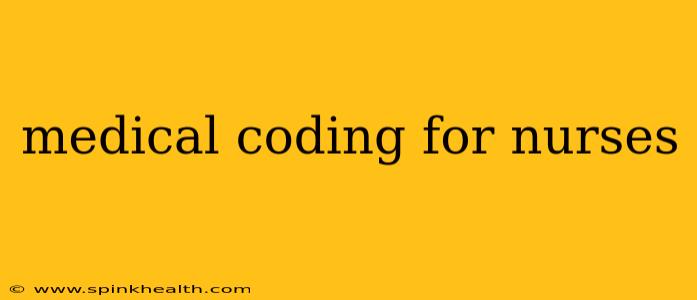The world of healthcare is vast and ever-evolving, offering a multitude of career paths for dedicated nurses. While bedside care remains the cornerstone of nursing, many nurses are discovering exciting opportunities beyond direct patient interaction. One such avenue is medical coding. This field blends the meticulous nature of nursing with the analytical skills required to translate medical information into standardized codes. Let's delve into this fascinating career path and explore its possibilities.
Imagine this: you're deeply familiar with medical terminology, diagnoses, and procedures—skills honed from years of bedside experience. Now, imagine using that knowledge not just to care for patients, but to ensure accurate and efficient billing for their care. This is the essence of medical coding for nurses. It's a behind-the-scenes role that plays a crucial part in the financial health of healthcare organizations.
What is Medical Coding?
Medical coding is the process of transforming medical diagnoses, procedures, and services into standardized alphanumeric codes. These codes are essential for insurance claims processing, medical research, and healthcare data analysis. Different coding systems exist, including the widely used ICD (International Classification of Diseases) for diagnoses and CPT (Current Procedural Terminology) for procedures. Understanding these systems is fundamental to successful medical coding.
Is Medical Coding Right for Me? A Nurse's Perspective
This is a question many nurses grapple with. The transition might seem daunting, but for those with a keen eye for detail, a passion for accuracy, and a strong understanding of medical terminology, it can be incredibly rewarding. Let's explore some frequently asked questions:
What skills do I need for medical coding?
Strong Medical Knowledge: A nursing background provides a significant advantage. Your existing understanding of anatomy, physiology, diseases, and procedures forms the bedrock of effective coding.
Attention to Detail: Medical coding demands precision. A single misplaced digit can lead to inaccurate billing and potentially serious consequences.
Analytical Skills: You'll need to dissect complex medical reports and identify the relevant codes to accurately reflect the care provided.
Computer Proficiency: Coding involves using specialized software and navigating complex databases.
What are the educational requirements for medical coding?
While formal education isn't always strictly required, many nurses choose to enhance their skills through:
- Certified Coding Associate (CCA) or Certified Coding Specialist (CCS) certifications: These credentials demonstrate competency and improve career prospects. Numerous organizations offer these certifications, often requiring coursework and examinations.
- Online courses and workshops: Many online platforms provide training in medical coding principles and specific coding systems. These options offer flexibility for working nurses.
What is the salary potential for a medical coder?
The salary for a medical coder varies based on experience, location, and certification. Generally, it offers a competitive salary, especially for those with nursing experience, as their medical background provides a distinct advantage in understanding complex medical records.
What are the career advancement opportunities in medical coding?
The field offers numerous opportunities for growth, including:
- Specialization: You can specialize in specific areas like inpatient, outpatient, or surgical coding.
- Team Leadership: Experienced coders can manage teams and mentor new coders.
- Coding Compliance: You can take on a compliance role ensuring accuracy and adherence to regulations.
- Medical Auditing: Reviewing medical records for accuracy and compliance is another area of growth.
How can I transition from bedside nursing to medical coding?
The transition requires careful planning. Begin by researching available certifications and online courses. Network with medical coders to learn about the field and potential opportunities. Consider shadowing or volunteering in a medical coding setting to gain firsthand experience.
The Future of Medical Coding for Nurses
With the ongoing shift toward electronic health records (EHRs) and the increasing complexity of healthcare, the demand for skilled medical coders is only expected to grow. For nurses seeking a new challenge, a career in medical coding offers a rewarding blend of medical expertise, analytical skills, and financial stability, making it a viable and fulfilling career path for nurses seeking a change from bedside care. It's a chance to leverage your existing skills and knowledge in a new and impactful role within the healthcare system.

